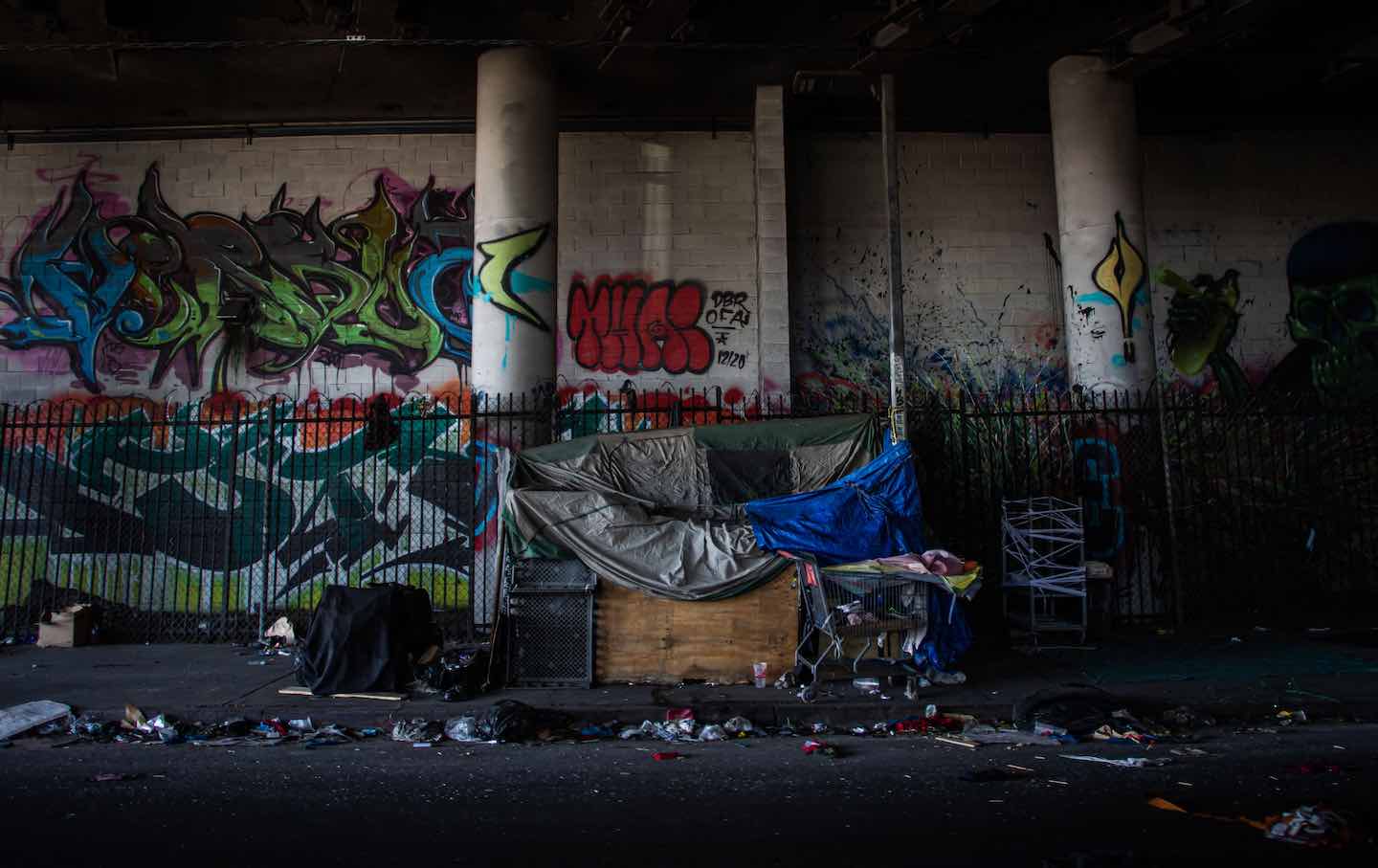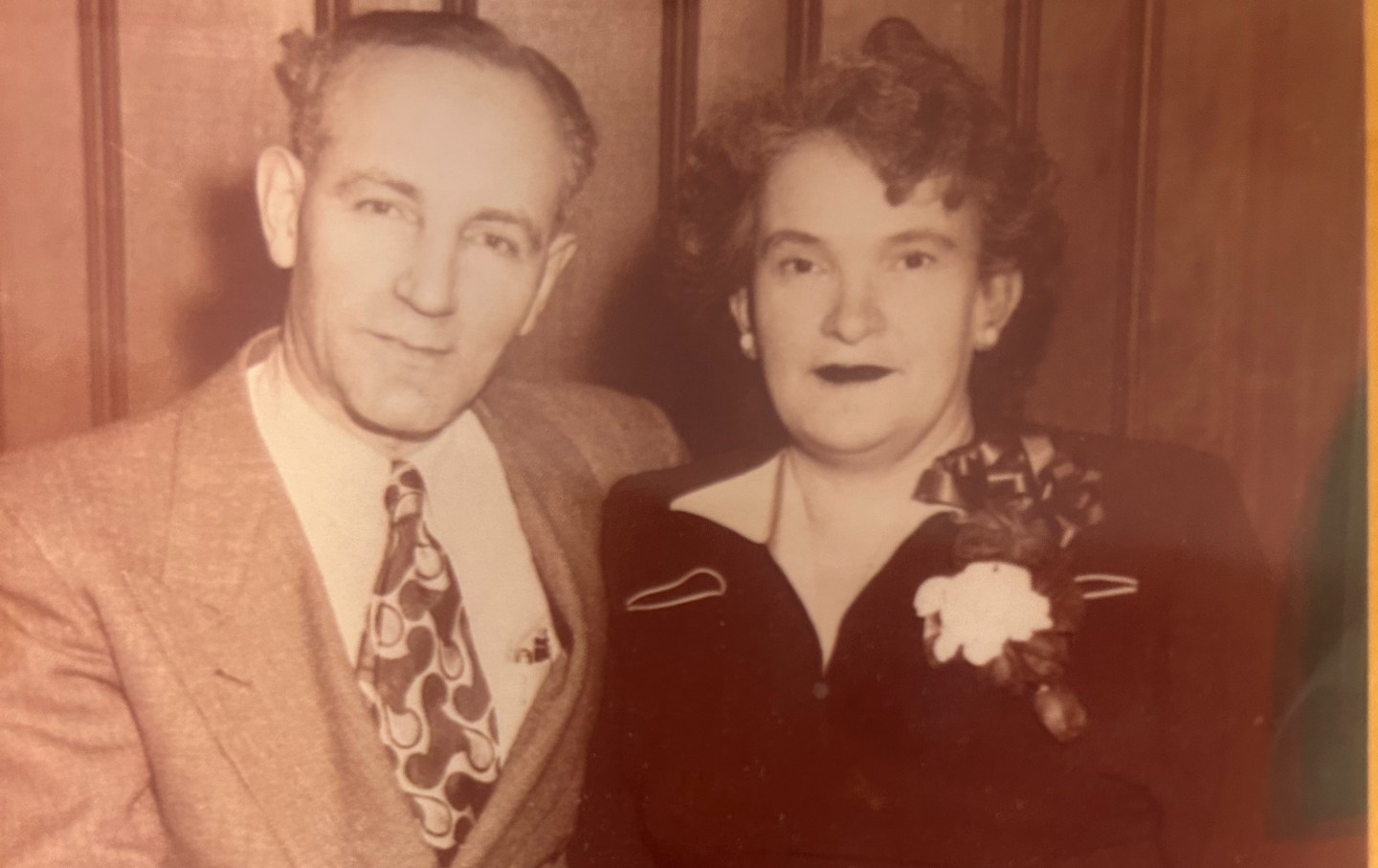Dysfunctional Los Angeles City Politics Threatens Housing Progress
Mayor Karen Bass’s administration has failed to live up to its own affordable-housing ambitions.

A homeless encampment under a bridge in downtown Los Angeles on July 26.
(Photo by Apu Gomes / AFP)
When Karen Bass was elected mayor of Los Angeles, it seemed that the city’s shameful neglect of its housing crisis would finally end. Bass, after all, is a progressive, and she staked much of her political capital during her mayoral campaign on a pledge to tackle the interconnected crises of homelessness and a dearth of affordable or supportive housing in the sprawling city.
Two years on, the promise is unfulfilled, and what progress has been made, through Bass-backed programs such as Inside Safe, which has moved thousands of people from the streets into motels, is now at risk of being reversed, according to advocates who have argued in court that city officials are using their clout to block new housing developments in affluent parts of town. Becky Dennison, co–executive director of the Venice Community Housing Corporation, told me in a recent conversation that different city agencies and officials are at war with each other over how to tackle the housing crisis and whether to share the burden equitably across neighborhoods. “There’s no unified message coming out of the city; it’s complete uncertainty. It creates a situation in which everybody loses.”
True, on-the-streets homeless numbers have declined for the first time since the start of the Covid pandemic, at least in part because of Bass’s efforts on the issue. But the declines are small (just over 2 percent in 2024), and upwards of 45,000 people continue to live on the sidewalks of Los Angeles, with tens of thousands more in the surrounding county.
When Los Angelenos are polled, by huge margins they report that housing and homelessness are their top local concerns, and large majorities of residents favor the city and state’s being more involved in developing affordable housing in the region. Two-thirds of residents also want more rental units in their neighborhoods. Yet progress is being stifled by an unsavory coalition of developers and affluent homeowners, who have sought to prevent affordable housing from being constructed in wealthier parts of town.
Karen Bass’s much-touted Executive Directive 1, which was aimed at fast-tracking affordable housing projects around the city, has been watered down to the point of absurdity. Under pressure from homeowners, especially on the wealthy West Side and in glitzier enclaves of the San Fernando Valley, Bass had the directive rewritten to exclude residential neighborhoods zoned exclusively for single-family housing. This change automatically excluded roughly three-quarters of the city, including most of its affluent, politically influential neighborhoods, from having to meet affordable-housing and supportive-housing targets. Those areas that weren’t excluded were poorer, and less white; thus, poverty and services for the unhoused remain concentrated in already-struggling communities.
Arguably, nowhere has the promise fallen shorter than in Venice, a picturesque beach community that has seen an explosion in homelessness and encampments in recent years. As I reported in 2021, homes along the canals in Venice can cost millions of dollars; meanwhile, a year into the pandemic, thousands were sleeping in tents along the boardwalk and in back alleys and parking lots.
In the years since, many of the encampments have been swept, and more will likely be dismantled in the wake of the Supreme Court’s recent ruling allowing cities to shut down encampments, and under Governor Gavin Newsom’s executive order urging cities to do just that. But Venice’s affordable-housing crisis remains as acute as ever.
Dennison’s group hopes to break ground on a 140-unit supportive housing development—one of eight city-owned lots identified, back in 2016, as being suitable for such projects—in early 2026. It is known as the Venice Dell supportive housing development, and was conceived as part of a larger, coordinated effort to tackle the community’s housing crisis. So far, however, it is more a dream than a reality.
In a sign of how dysfunctional Los Angeles city politics around housing continues to be, city agencies, urged on by affordable-housing advocates, recently fought two lawsuits, brought by NIMBYist community groups opposed to the project. The city won the lawsuits, tamed the NIMBYists, and for a while it looked as if the project would proceed as planned. Meanwhile, however, council member Traci Park and the City Attorney’s office under Hydee Feldstein Soto quietly launched their own rearguard action to stonewall the project, exerting pressure on the Departments of City Planning and of Transportation to withhold vital notices of clarification from the Coastal Commission, without which the commission cannot issue the final permits needed for development projects near the ocean to get underway. Those documents have been on ice for over a year now, resulting in a Fair Housing lawsuit being filed against the city last month, and an investigation being launched by the state’s Housing Accountability Unit.
In other words, taxpayer dollars were recently spent to allow the city to fight in the courts in favor of the affordable-housing development. Now, additional taxpayer dollars will be spent allowing the city to defend itself in court against allegations that it is illegally opposing that very same development. That isn’t just dysfunctional; it’s absurd.
Since January 2023, Dennison’s organization has been asking the Coastal Commission whether the needed paperwork has been filed and whether the project can proceed. And each time they ask, the commission tells the group that they have to get more information from the city attorney or from councillor Park—information that isn’t forthcoming. “Everybody’s just pointing fingers at each other,” Dennison says in exasperation.
For Mike Bonin, who represented Venice on the city council from 2013 to 2022 and now lectures on public policy at Occidental College and USC, and who has long worked on housing issues in his community, the ongoing efforts are nothing short of shameful. “A lot of it has been done behind the scenes, absent a council vote,” he answers. “There has been an approach both through policy and denial of projects, of pushing the problem onto other parts of the city.” Richer, whiter areas of the city, Bonin argues, are “very resistant to more housing—they don’t like affordable housing, don’t like housing for the homeless.” As a result, projects like the Venice Dell are stalling out, encampments are being swept, and existing shelters for the homeless on the West Side are being shuttered as the unhoused in those facilities or who are on the streets are being removed to poorer, less-white neighborhoods around Los Angeles. “Every neighborhood in Los Angeles needs to be part of the solution,” Bonin avers. “But you have parts of the city who are exempting themselves from it. Everybody needs housing. That is, to me, a moral absolute.”
Mayor Bass’s instincts around tackling the housing crisis are sound. But her administration over the past two years has failed to live up to its own affordable-housing ambitions. The difficulties facing the Dell project in Venice sum up the chaos and dysfunction around housing policy in the greater-LA region. It’s past time for the mayor to take control of the situation and past time for important affordable-housing projects to be given the green light.
Disobey authoritarians, support The Nation
Over the past year you’ve read Nation writers like Elie Mystal, Kaveh Akbar, John Nichols, Joan Walsh, Bryce Covert, Dave Zirin, Jeet Heer, Michael T. Klare, Katha Pollitt, Amy Littlefield, Gregg Gonsalves, and Sasha Abramsky take on the Trump family’s corruption, set the record straight about Robert F. Kennedy Jr.’s catastrophic Make America Healthy Again movement, survey the fallout and human cost of the DOGE wrecking ball, anticipate the Supreme Court’s dangerous antidemocratic rulings, and amplify successful tactics of resistance on the streets and in Congress.
We publish these stories because when members of our communities are being abducted, household debt is climbing, and AI data centers are causing water and electricity shortages, we have a duty as journalists to do all we can to inform the public.
In 2026, our aim is to do more than ever before—but we need your support to make that happen.
Through December 31, a generous donor will match all donations up to $75,000. That means that your contribution will be doubled, dollar for dollar. If we hit the full match, we’ll be starting 2026 with $150,000 to invest in the stories that impact real people’s lives—the kinds of stories that billionaire-owned, corporate-backed outlets aren’t covering.
With your support, our team will publish major stories that the president and his allies won’t want you to read. We’ll cover the emerging military-tech industrial complex and matters of war, peace, and surveillance, as well as the affordability crisis, hunger, housing, healthcare, the environment, attacks on reproductive rights, and much more. At the same time, we’ll imagine alternatives to Trumpian rule and uplift efforts to create a better world, here and now.
While your gift has twice the impact, I’m asking you to support The Nation with a donation today. You’ll empower the journalists, editors, and fact-checkers best equipped to hold this authoritarian administration to account.
I hope you won’t miss this moment—donate to The Nation today.
Onward,
Katrina vanden Heuvel
Editor and publisher, The Nation
More from The Nation

The Supreme Court v. My Mother The Supreme Court v. My Mother
After my mother escaped the Holocaust, she broke the law to save her family. Her immigration story is more pertinent today than ever before.

White Farmers Are Getting a Taste of Their Own Medicine White Farmers Are Getting a Taste of Their Own Medicine
Trump’s tariffs and immigration raids are driving the latest farm crisis. White farmers have stood by him year after year—and still do.

The Slop of Things to Come The Slop of Things to Come
This past week boasted many overhyped AI breakthroughs, but the healthiest one was the fierce repudiation of a contemptuous McDonald’s ad.

Keeping the Police Out of Pregnancy Care Keeping the Police Out of Pregnancy Care
We must be vigilant in keeping law enforcement out of exam rooms.

The Stagecraft Behind the New Orleans Immigration Raids The Stagecraft Behind the New Orleans Immigration Raids
In a text exchange, Border Patrol Commander Gregory Bovino calls his operation a “massive disturbance” in the making.

“This Is Historic”: FIFA and UEFA Presidents Are Accused of Aiding Israel’s War Crimes “This Is Historic”: FIFA and UEFA Presidents Are Accused of Aiding Israel’s War Crimes
A coming filing with the ICC accuses FIFA’s Gianni Infantino and UEFA’s Aleksander Čeferin of crimes against humanity for their financial support of settlement clubs.


